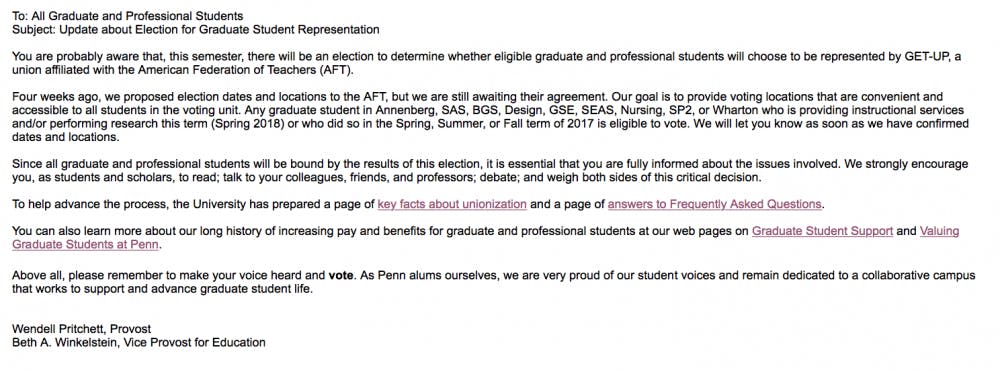
File Photo
As Penn's graduate students move closer to a vote on whether student workers can unionize, the University has increased its efforts to prevent the union from forming.
Graduate students, led by the pro-union organization Graduate Employees Together — University of Pennsylvania, received permission in December 2017 from the Philadelphia National Labor Relations Board to hold an election deciding whether or not they will form a union.
While Penn has not been shy about its opposition to graduate students unionizing in the past, administrators now have been taking a more active role in the past week in reminding students of what they see as the possible negative consequences associated with a unionization vote.
Provost Wendell Pritchett and Vice Provost for Education Beth Winkelstein sent out an email to all graduate and professional students concerning the upcoming election.

Pritchett and Winkelstein wrote that the location and date of the vote had yet to be determined, but that "any graduate student in Annenberg, SAS, BGS, Design, GSE, SEAS, Nursing, SP2, or Wharton who is providing instructional services and/or performing research this term (Spring 2018) or who did so in the Spring, Summer, or Fall term of 2017 is eligible to vote."
They reminded the students that all graduate students would be subject to the decision and directed them to a recently created FAQ page on the Provost's Office's website.
The site explains the details of the upcoming election, the possible effects of unionization, and the support the University provides for graduate students. It also provides links for further reading regarding unionization attempts at other schools.
To explain what a union would do for students, the website emphasized a lack of clarity regarding the possible benefits of a union, stating that collective bargaining will determine the possible effects.
"[T]here is no guarantee that collective bargaining would result in any increase to stipends or benefits. In fact, students could be worse off in the long run under collective bargaining," the website read.
Dean of Engineering Vijay Kumar and Deputy Engineering Dean for Research and Innovation Kathleen Stebe co-authored an email sent out last week on Feb. 7 to Engineering doctoral students warning them about the possible negatives associated with unionization.

Screenshot
Kumar and Stebe cautioned that a vote for unionization could result in a loss of academic flexibility, a financial burden in terms of union dues, and a possible change in students' relationships with their academic advisors.
"This vote is very important for several reasons. If the union wins, you will lose your own voice and the right to advocate for yourself with respect to any item covered by the union contract," the email read. "Please give this vote the attention that it deserves and engage with your colleagues and the faculty in a serious discussion."
Kelly Jordan-Sciutto, director of the Biomedical Graduate Studies and associate dean for Graduate Education at the Perelman School of Medicine, co-authored another email along with more than 20 other colleagues in Biomedical Graduate Studies.
Sent out around 11:46 a.m. on Feb. 7, Jordan-Sciutto and other leaders of the department encouraged students to vote in the election.
"Under current National Labor Relations Board law, graduate students may unionize based on their teaching and research roles," the BGS email read. "To us, the primary question at stake is this: Are you students or employees?"
The writers argued that the graduate students are fundamentally students due to the fact that their work in the program is "designed to foster your personal and intellectual growth."
They warned that the formation of a union could jeopardize the financial stipends and research training of BGS graduate students.
"We are concerned that GET-UP will not be able to adequately serve the unique needs of BGS students, which are different from the needs of other students in the many diverse programs the union seeks to represent," the email concluded.
"Union contracts are often one-size-fits-all, and we are concerned that this means Penn’s graduate students will end up with a one-size-fits-none contract."
The date for the election has yet to be established.
The Daily Pennsylvanian is an independent, student-run newspaper. Please consider making a donation to support the coverage that shapes the University. Your generosity ensures a future of strong journalism at Penn.
Donate







